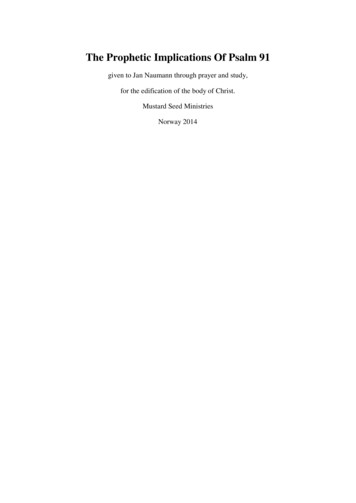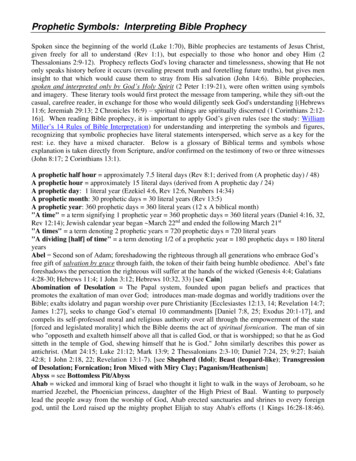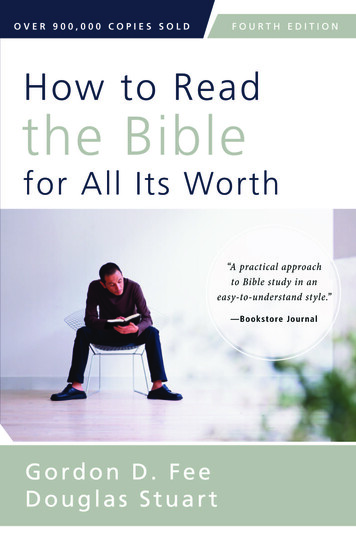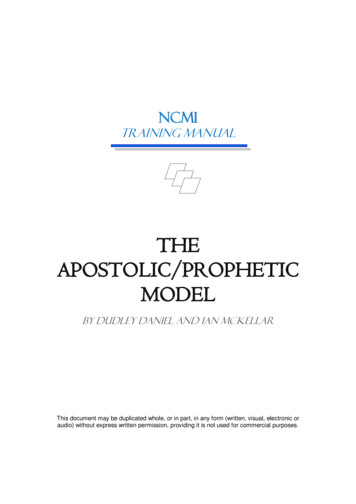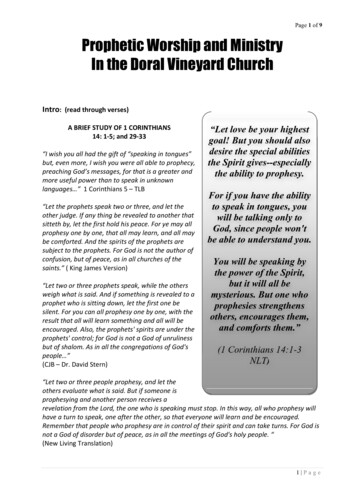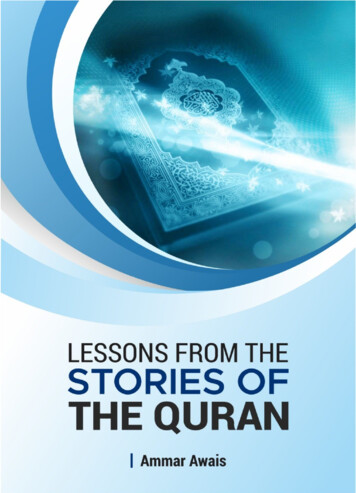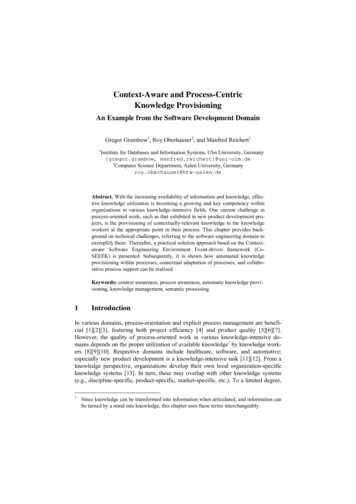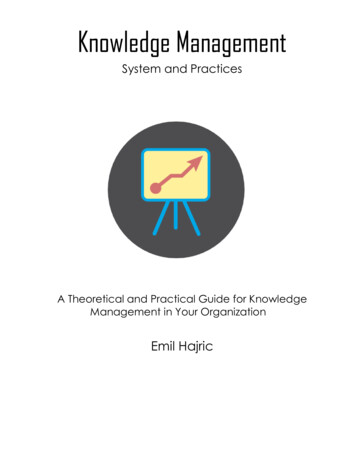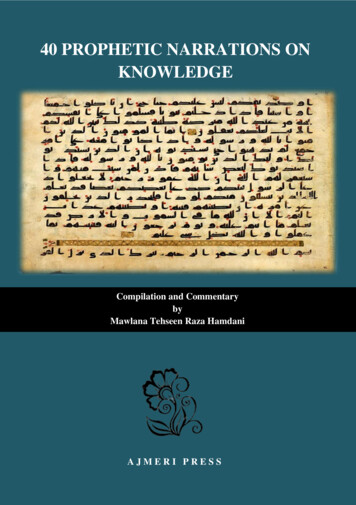
Transcription
40 PROPHETIC NARRATIONS ONKNOWLEDGECompilation and CommentarybyMawlana Tehseen Raza HamdaniAJMERI PRESS
40 Prophetic Narrations onKnowledgeCompilation & Commentary byTehseen Raza renceAjmeri PressCopyright Ajmeri PressNovember 2018Rabi’ al Awwal 1440 ess.com 2018 Ajmeri PressPublished byManzar e IslamRustenburg,Republic of South AfricaAJMERI PRESS
ContentsPrologue by the translator . 1Hadith 1 – Beneficial knowledge . 4Hadith 2 – Knowledge is not cursed . 5Hadith 3 – Death of the scholars . 6Hadith 4 – Memorising and conveying knowledge . 7Hadith 5 – Seeking of knowledge is obligatory . 8Hadith 6 – Sharing of rewards . 9Hadith 7 – Fire of Hell for those who abuse knowledge . 10Hadith 8 – Path to Paradise . 11Hadith 9 – In the way of Allah . 11Hadith 10 –Knowledge wipes the past sins . 12Hadith 11 – Concealing knowledge . 13Hadith 12 – Self-interpretation of the Qur’an . 14Hadith 13 – Who should be the Imam . 15Hadith 14 – Difference between a scholar and non-scholar . 16Hadith 15 – The best charity . 17Hadith 16 – Signs of the Last Day . 18Hadith 17 – Goodness in this world and the Hereafter . 19Hadith 18 – Seek refuge in Allah from four things . 20Hadith 19 – Three categories of Knowledge . 21Hadith 20 – Knowledge for worldly purposes . 22Hadith 21 – Learn knowledge of inheritance . 23Hadith 22 – Tribulations . 24Hadith 23 – Verdict of a Qaadhi . 25Hadith 24 – Angels lower their wings . 26Hadith 25 – Not acting upon the knowledge . 27Hadith 26 – My similitude is that of rain . 28Hadith 27 – Three things benefit a deceased . 29Hadith 28 – The most despicable one . 30Hadith 29 – Esoteric knowledge . 31Hadith 30 – Envy is permissible in two cases. 32Hadith 31 – Milk represents knowledge . 33
Hadith 32 – A man who travels solely to gain knowledge . 34Hadith 33 – Teaching knowledge . 35Hadith 34 – Be careful from whom you learn knowledge . 36Hadith 35 – Knowledge is a superior form of worship . 37Hadith 36 – Make things easy for people . 38Hadith 37 – If Allah intends goodness for a person . 39Hadith 38 – Associating a lie towards the Prophet ﷺ . 40Hadith 39 – Trait of a hypocrite . 41Hadith 40 – Advice of Luqman, the Wise . 42
PrologueAll praise and glory is for Allah, the Exalted, the AllKnowing, Mighty Lord of the Universe. His Knowledge iseverlasting and absolute and He bestows knowledge towhosoever He wills. His first revelation to His most esteemedProphet { }ﷺ was about knowledge and it is knowledge thatexcels and distinguishes mankind from the other creation.Knowledge itself is a three phase process for it to bebeneficial. The initial phase is the acquiring of information.Most people who claim to be knowledgeable halt here,unwisely assuming that this is knowledge. The second phaseafter acquiring information is the process of understandingand analysing the information. This aspect is crucial for everyindividual who aspires to become a jurist or a scholar.Because, understanding the spheres of the information willallow one to proceed to the final phase of knowledge:implementation. When information is acquired, analysed andimplemented – then such an individual will see the fruits ofknowledge; otherwise simply acquiring information from thetexts and speeches serves no benefit except that the individualwill remain stagnant like a lonesome dusty book in a library.Each Hadith has been commented upon for the benefit of thereaders so that they may understand the Hadith and thereafterimplement on its injunctions. For the Pleasure of my MercifulCreator, the compilation and commentary was completedwithin a week by this weak servant. Salutations in abundancebe upon the esteemed Messenger of Allah, SayyidunaMuhammad Al-Mustafa { }ﷺ , his pure household, hisPage 1
illustrious companions and every jurist and scholar of Islamwho implemented knowledge for the benefit of mankind.Khaadim al-MashaaikhTehseen Raza Hamdani NuriPage 2
Page 3
Hadith 1Beneficial knowledgeَ قَال ،ٍ عَ ْن جَابِر ،ِ عَنْ مُحَمَّدِ بْنِ الْمُْنكَدِر ،ٍ عَنْ ُأسَامَةَ بْنِ زَيْد ،ٌ حَدَّثَنَا وَكِيع ،ٍ حَدَّثَنَا عَلِيُّ بْنُ مُحَمَّد ُ قَالَ َرسُولُ اللَّهِ صلى اهلل عليه وسلم سَلُوا اللَّهَ عِلْمًا نَاِفعًا وََتعَوَّذُوا بِاللَّهِ مِنْ عِلْمٍ الَ يَْنفَع Narrated by Jabir { }ريض اهللاعتيل عنه that the Prophet { }ﷺ said:“Ask Allah for beneficial knowledge1 and seek refuge withAllah from knowledge that is of no benefit.”{Sunan Ibn Ma’ajah, Kitaab ad-Duaa, Hadith 3843}1Beneficial knowledge refers to that which humbles a person, increasessincerity and brings one closer to the Divine Proximity. It also refers to thatknowledge which will benefit the creation in this world and the Hereafter.Ibn Rajab Hanbali [may Allah have mercy on him] has referred beneficialknowledge to all those branches of knowledge which is learned for thepleasure of Allah and any knowledge that is acquired for the sake of thecreation, such as wealth, then it is considered non-beneficial. The questionthat arises is whether secular knowledge such as mathematics, physicalsciences, geography and so forth – are these beneficial? Deducing from thewords of Ibn Rajab Al-Hanbali, we may categorise this knowledge to bebeneficial if the pleasure of Allah is intended – for example, ‘O Allah, I amlearning this knowledge so that it may benefit the religion of Islam’, or ‘OAllah, I am learning this knowledge of physical science so that it maybenefit Islam in terms of Jihad’. Many such intentions are noble and nobleintentions are rewardable in the sight of Allah. The Prophet { }ﷺ used toreceive letters in the Hebrew language so he ordered Zayd bin Thabit { ريض اهلل }اعتيل عنه to learn this language because knowing about it will bring benefit toIslam. Zayd bin Thabit { }ريض اهلل اعتيل عنه learnt this language in seventeen days.Similarly, there is a narration in which the Prophet { }ﷺ ordered theMuslims to acquire knowledge of things that are known by the disbelieversso that Muslims may use this knowledge for their advantage. In moderntimes, we may deduce these narrations and allot secular education, alongwith religious education, to our children with the intention of pleasing AllahTa’ala. May Allah grant us the ability – Aameen!Page 4
Hadith 2Knowledge is not cursed،َ عُتْبَةُ ْبنُ حَمَّادٍ الدِّمَشْقِيُّ َعنِ اْبنِ َثوْبَان ،ٍ حَدَّثَنَا أَبُو ُخلَيْد ،ُّ حَدَّثَنَا َعلِيُّ ْبنُ مَيْمُونٍ الرَّقِّي ُ قَالَ سَمِ ْعت ،َ قَالَ حَدَّثَنَا أَبُو هُرَْيرَة ،ِّ السلُولِي َّ َ َعنْ عَبْدِ اللَّهِ ْبنِ ضَمْرَة ،َ َعنْ َعطَاءِ ْبنِ قُرَّة رَسُولَ اللَّهِ صلى اهلل عليه وسلم وَ ُهوَ يَقُولُ الدُّنْيَا َملْعُونَةٌ َملْعُونٌ مَا فِيهَا إِالَّ ِذكْرَ اللَّهِ وَمَا وَاالَهُ َأوْ عَالِمًا َأوْ مُتَ َعلِّمًا Abu Hurairah { }ريض اهلل اعتيل عنه said: I heard the Messenger of Allah{ }ﷺ saying:“This world is cursed and what is in it is cursed2, except theremembrance of Allah (dhikr) and that which is conducive toit, or one who has knowledge or one who acquiresknowledge.”{Sunan Ibn Majah, Kitaab Az-Zuhd, Hadith 4112}2It is cursed in a way that it has a great influence over the heart of mankind.Man continues to hoard this world even though he knows that death isinevitable. In this context, it is cursed otherwise it becomes a blessing fromAllah for those who live in accordance with the articles of Islam. Amongthe blessings in this world is the remembrance of Allah or anything thatinduces the remembrance of Allah, such as knowledge, its scholars and theseekers of knowledge. Being obedient to the commands of Allah and HisMessenger { }ﷺ will allow this world to become a blessing otherwise itwill be a curse.Page 5
Hadith 3Death of the scholars َعنْ أَبِي ،ُ وَغَيْرُه ،ٍ حَدَّثَنِي عَبْدُ الرَّحْ َمنِ ْبنُ شُرَيْح ،ٍ حَدَّثَنِي اْبنُ وَ ْهب ،ٍ حَدَّثَنَا سَعِيدُ ْبنُ َتلِيد َج َعلَيْنَا عَبْدُ اللَّهِ ْبنُ عَمْرٍو فَسَمِعْتُهُ يَقُولُ سَمِ ْعتُ النَّبِيَّ صلى َّ قَالَ ح ،َ َعنْ عُ ْروَة ،ِ األَ ْسوَد ْ َولَ ِكنْ يَنْتَزِعُهُ مِْنهُم ، اهلل عليه وسلم يَقُولُ إِنَّ اللَّهَ َال يَنْزِعُ الْ ِعلْمَ بَعْدَ أَنْ أَ ْعطَاهُمُوهُ انْتِزَاعًا َ َفيُضِلُّونَ وَيَضِلُّون ،ْ فَيَبْقَى نَاسٌ جُهَّالٌ يُسْتَفَْتوْنَ فَيُفْتُونَ بِرَأِْيهِم ،ْ مَعَ قَبْضِ الْ ُعلَمَاءِ بِ ِعلْ ِمهِم Narrated by Abdullah bin Amr { عنه Prophet { }ﷺ said, }ريض اهلل اعتيل I heard the“Allah will not deprive you of knowledge after He has givenit to you3, but it will be taken away through the death of thereligious learned men with their knowledge4. Then there willremain ignorant people who, when consulted, will giveverdicts according to their opinions whereby they will misleadothers and go astray.”{Bukhari, Kitaab Al-I’tisaam bil Kitaab Was-Sunnah, Hadith 7307}3When knowledge is blessed by Allah, it will not be snatched awaysuddenly because this is a speciality of this nation of Muhammad { }ﷺ .Yes, forgetfulness is another matter which transpires if a person does notprotect his knowledge from stagnancy.4Occurrences of the death of true scholars of Islam will increase as the Dayof Resurrection looms closer. The scholars of Islam are the vessels ofknowledge. Allah Ta’ala will not cause the knowledge within these vesselsto disappear, rather He will cause the vessels of the knowledge to expire –that is – the righteous scholars will pass away. Whatever will be left will bemostly the ignorant and immoral scholars who will pass incorrect verdictsthat will proliferate misguidance. This Hadith gives an indication thatscholars are of two categories – righteous and misguided. We must ensurewe acquire the company of righteous scholars of Islam.Page 6
Hadith 4Memorising and conveying Knowledgeِ ِمنْ وَلَدِ عُمَرَ بْن ،َ حَدَّثَنِي عُمَرُ ْبنُ ُسلَيْمَان ،َ َعنْ شُعْبَة ، حَدَّثَنَا يَحْيَى ،ٌ حَدَّثَنَا مُسَدَّد ِ قَالَ سَمِعْتُ رَسُولَ اللَّه ،ٍ َعنْ زَيْدِ ْبنِ ثَاِبت ،ِ َعنْ أَبِيه ،َ الْخَطَّابِ َعنْ عَبْدِ الرَّحْ َمنِ ْبنِ أَبَان ِ صلى اهلل عليه وسلم يَقُولُ نَضَّرَ اللَّهُ امْرَأً سَمِعَ مِنَّا حَدِيثًا فَحَ ِفظَهُ حَتَّى يُبَلِّغَهُ فَرُبَّ حَا ِمل ٍ فِقْهٍ إِلَى َمنْ ُهوَ َأفْقَهُ مِنْهُ َورُبَّ حَا ِملِ فِقْهٍ لَيْسَ بِفَقِيه Narrated Zayd ibn Thabit { }ريض اهلل اعتيل عنه : I heard the Messenger ofAllah { }ﷺ say:“May Allah brighten a man who hears a tradition from us,memorises it by heart and passes it on to others5. Many timesa bearer of knowledge conveys it to one who is more versedthan he is; and in other times a bearer of knowledge is notwell-versed in it [than the recipient].”6{Sunan Abu Dawood, Kitaab Al-Ilm, Hadith 3660}5Hearing, memorising and propagating are the three stages of knowledge.When one hears it, he also must understand its context, theme, aim andreason. Thereafter, one must memorise this understanding and the actualtext which will need to be related or implemented later on for the benefit ofMuslims. Such a person will be qualified for the supplication of the Prophet{ }ﷺ indicated in the words of the Hadith – that is, his face and his heartwill become illuminated with the light of guidance.6It is not necessary that the teacher of knowledge be more qualified thanthe learner and vice versa. It is not the position of a person that allows himto be more distinct than others – rather it is solely the blessings from AllahTa’ala.Page 7
Hadith 5Seeking Knowledge is obligatoryِ َعنْ مُحَمَّدِ بْن ،ٍ حَدَّثَنَا كَِثريُ ْب ُن شِْن ِظري ،َ حَدَّثَنَا حَفْصُ ْب ُن ُسلَيْمَان ،ٍ حَدَّثَنَا هِشَامُ ْب ُن عَمَّار ٌ ب الْ ِعلْمِ فَرِيضَة ُ َ قَالَ قَالَ رَسُو ُل اللَّ ِه صلى اهلل عليه وسلم َطل ،ٍ َع ْن أَنَسِ ْبنِ مَالِك ،َ ِسريِين ب َ َ َاللؤُْلؤَ وَالذَّه ُّ جوْهَرَ و َ ْ سلِمٍ َووَاضِ ُع الْ ِعلْ ِم عِنْدَ غَيْ ِر أَ ْهلِهِ كَمُ َقلِّ ِد الْخَنَازِي ِر ال ْ ُ َعلَى كُلِّ م It was narrated from Anas bin Malik { }ريض اهلل اعتيل عنه that theMessenger of Allah { }ﷺ said:“Seeking knowledge is a duty upon every Muslim7, and hewho imparts knowledge to those who do not deserve it, is likeone who places a necklace of jewels, pearls and gold aroundthe necks of the swine8.”{Sunan Ibn Ma’jah, Kitaab al-muqaddima, Hadith 224}7Every Muslim: male or female, slave or master, black or white, child orparent, young or old, rich or poor, king or courtier, traveller or resident, sickor healthy, scholar or ignorant.8Not everyone is worthy of receiving knowledge that is – any knowledgethat is more than which is necessary. Because extra knowledge will eithermake a person boastful and he will argue with other scholars based on thatextra knowledge that a person possesses. Or else, he will disregard it andcause it to become a means of mischief for the people. This Hadith is anindication that when sermons are issued to laymen it should be done so withsimple language and basic knowledge that is incumbent for the laymen tounderstand. More than this may become a cause of disunity and mischief. Italso indicates that students in the Islamic institutions must be audited fortheir behaviour and ethics. Those who do not qualify to become scholarsmust be expelled by the institutional management; otherwise suchunqualified so-called students will acquire knowledge for worldly gain andultimately taint the pristine image of Islamic scholarship.Page 8
Hadith 6Sharing of rewardsِ َعنْ َعلِيِّ بْن ،َ حَدَّثَنَا عُثْمَانُ ْبنُ أَبِي عَاتِكَة ،ٍ حَدَّثَنَا صَ َدقَةُ ْبنُ خَالِد ،ٍ حَدَّثَنَا هِشَامُ ْبنُ عَمَّار قَالَ قَالَ رَسُولُ اللَّهِ صلى اهلل عليه وسلم َعلَيْكُمْ ِبهَذَا ،َ َعنْ أَبِي أُمَامَة ،ِ َع ِن الْقَاسِم ،َ يَزِيد الْ ِعلْمِ قَْبلَ أَنْ يُقْبَضَ َوقَبْضُهُ أَنْ يُ ْرفَعَ وَجَمَعَ بَْينَ إِصْبَعَيْهِ اْلوُ ْسطَى وَالَّتِي َتلِي اإلِْبهَامَ هَكَذَا ِ ثُمَّ قَالَ الْعَالِمُ وَالْ ُمتَ َعلِّمُ شَرِيكَانِ فِي األَجْرِ َوالَ خَيْرَ فِي سَائِ ِر النَّاس It was narrated that Abu Umamah { عنه Messenger of Allah { }ﷺ said: }ريض اهلل اعتيل said: The“You must acquire this knowledge before it is taken away,and its taking away means that it will be lifted up.” He joinedhis middle finger and the one next to the thumb like this, andsaid: “The scholar and the seeker of knowledge will share thereward, and there is no good in the rest of the people.”9{Sunan Ibn Ma’ajah, Kitaab Al Muqaddima, Hadith 228}9Sharing of reward means that the reward will not diminish by the other.The virtue of knowledge only increases as much as knowledge is circulatedwithin the people, especially the teachers and the students. As for anyonewho does not seek knowledge – one will find no goodness in them. Thisdoes not refer to the laymen or any person who is not a student in an Islamicinstitution. Rather, the context of the Hadith refers to any Muslim whetherhe is a businessman or a labourer – if he or she does not strive to learnknowledge nor acquire the company of those who attain knowledge, norlove those who are knowledgeable – then there is no goodness in them.There is a narration of the Prophet { }ﷺ that substantiates this reasoning:“Make sure you find yourselves from the following, either be a scholar, or astudent of knowledge, or those who sit in their company or the one wholoves them. Beware, do not become the fifth one.” [I could not find thereference to this Hadith due to my limited knowledge. If anyone has thereference to it please forward it to ajmeripress@gmail.com – May Allahreward you!]Page 9
Hadith 7Fire of Hell for those who abuse knowledge عَنْ أَبِي ،ٍ عَنِ ابْنِ جُرَيْج ،َ أَنَْبأَنَا يَحْيَى بْنُ أَيُّوب ،َ حَدَّثَنَا ابْنُ أَبِي مَرْيَم ، حَدَّثَنَا مُحَمَّدُ بْنُ يَحْيَى َ أَنَّ النَّبِيَّ صلى اهلل عليه وسلم قَالَ َال َتعَلَّمُوا اْلعِلْمَ لِتُبَاهُوا بِهِ اْلعُلَمَاء ،ِ عَنْ جَابِرِ بْنِ عَبْدِ اللَّه ،ِ الزُّبَيْر ُ السفَهَاءَ وَالَ تَخَيَّرُوا بِهِ الْمَجَالِسَ فَمَنْ َفعَلَ ذَلِكَ فَالنَّارُ النَّار ُّ ِ وَالَ لِتُمَارُوا بِه Narrated by Jabir bin { }ريض اهللاعتيل عنه that the Prophet { }ﷺ said:“Do not seek knowledge in order to show off in front of thescholars10, or to argue with the foolish11, and do not choosethe best seat in a gathering12 due to it for whoever does that,the Fire, the Fire (awaits him).”{Sunan Ibn Ma’jah, Kitaab Al Muqaddima, Hadith 254}10If a person acquired knowledge to boast about his knowledge then suchknowledge is not beneficial for him – rather it becomes a curse. Thisbehaviour falls under the minor polytheism [shirk al-khafee] which means aperson’s intention is defective for he wishes to attain the pleasure of thepeople instead of the Creator. Minor polytheism is a major sin in Islam andrepentance is compulsory. It is also interesting to note that boasting alsobecomes manifested during debates between the two parties. The wholeidea of a debate is to allow the truth to become manifest and when it doesthe debate comes to an end. But due to egotistical behaviours, debatescontinue in order to show others the knowledge of oneself over theopponent – may Allah save us from this disease.11Silence is the keynote milestone when it comes to answering the ignorantwho wish to spread calumnies and mischief within the community. Aperson of knowledge need not discuss anything with the ignorant if theirmotives become clear. This Hadith also refers to the misguided – for theyare intensely ignorant of the true path. There is no reason for one to arguewith them or debate them, for their hearts are sealed by Allah Ta’ala.12May Allah Ta’ala save us from this practice! However, if the people givethe scholar such a seat out of respect and honour, then there is no harmbecause honouring a scholar of Islam is a virtuous action.Page 10
Hadith 8Path to Paradiseُ قَالَ قَالَ رَسُول ،َ عَنْ أَبِي ُهرَْيرَة ،ٍ عَنْ أَبِي صَالِح ،ِ عَنِ األَعْمَش ،َ حَدَّثَنَا أَبُو أُسَا َمة ،َ حمُودُ بْنُ غَيْالَن ْ َ حَدَّثَنَا م ِ اللهُ َلهُ َطرِيقًا إِلَى الْجَنَّة َّ َ اللهِ صلى اهلل عليه وسلم مَنْ سَلَكَ َطرِيقًا يَلْتَمِسُ فِيهِ عِلْمًا َسهَّل َّNarrated by Abu Hurairah { }ريضاهللاعتيل عنه that Nabi { }ﷺ said:“Whoever takes a path upon which to obtain knowledge,Allah makes the path to Paradise13 easy for him.”{Jaami’ Tirmidhi, Kitaab al-‘ilm, Hadith no. 2646}Hadith 9In the cause of Allahِ عَنْ أَنَس ،ٍ عَنِ الرَّبِيعِ بْنِ أَنَس ،ِّ عَنْ أَبِي جَعْ َفرٍ الرَّازِي ،ُّ قَالَ حَدَّثَنَا خَاِلدُ بْنُ َيزِيدَ الْعَتَكِي ،ٍّ حَدَّثَنَا نَصْرُ بْنُ عَلِي َ اللهِ حَتَّى يَرْجِع َّ ِ اللهِ صلى اهلل عليه وسلم مَنْ خَرَجَ فِي طَلَبِ الْعِلْمِ َف ُهوَ فِي سَبِيل َّ ُ قَالَ قَالَ رَسُول ،ٍ بْنِ مَالِك Narrated by Anas bin Malik { }ريض اهلل اعتيل عنه : The Messenger ofAllah { }ﷺ said:“Whoever goes out seeking knowledge then he is in Allah'scause14 until he returns.”{Jaami’ Tirmidhi, Kitaab al-‘ilm, Hadith 2647}13The path to Paradise is the path of obedience to Allah and His Messenger{ }ﷺ . A knowledgeable person will know the rulings of worship and theirattachments and this will help the person to accomplish the commandmentsof Islam in the most effective manner as possible. This in return will allowone to reach Paradise easily.14He continues to acquire virtues as long as he is making an effort oflearning the religion or any beneficial knowledge for the sake of Islam.Page 11
Hadith 10Knowledge wipes the past sins،َ عَنْ أَبِي دَاوُد ،َ حَدَّثَنَا زِيَادُ بْنُ خَيْثَمَة ، حَدَّثَنَا مُحَمَّدُ بْنُ الْمُعَلَّى ،ُّ حَدَّثَنَا مُحَمَّدُ بْنُ حُمَيْدٍ الرَّازِي َ عَنِ النَّبِيِّ صلى اهلل عليه وسلم قَالَ مَنْ طَلَبَ اْلعِلْمَ كَان ،َ عَنْ سَخْبَرَة ،َ عَنْ عَبْدِ اللَّهِ بْنِ سَخْبَرَة َكفَّارَةً لِمَا مَضَى Narrated by 'Abdullah bin Sakhbarah { [ }ريض اهلل اعتيل عنه from hisfather] that the Prophet { }ﷺ said:“Whoever seeks knowledge, he is atoning for what haspassed15 (of sins while doing so)”{Jaami’ Tirmidhi, Kitaab al-‘ilm, Hadith 2648}15Referring to minor sins for they become atoned by performing agood deed for the sake of Allah Ta’ala. A major sin cannot be erasedby performing a good deed unless a person repents for it. However,there are some deeds that may also erase the major sins of a person,such as, becoming martyred in the way of Allah, or performing anaccepted Hajj. A narration in the Sunan of Ibn Ma’ajah has alsoreferred the prayer of Tasbeeh to be an atonement of all major andminor sins. This transpires by the permission of Allah Ta’ala.However, this does not mean that simply performing these goodactions will render one safe from the consequences of usurping therights of people. It is in a narration that the sins of the martyr areforgiven except for his debts. Similarly, any infringement on therights of people will not be forgiven unless they are resolved in thisworld. A man who usurps a dirham of another in this world willhave to face the consequences of utter bankruptcy in the Hereafter –may Allah Ta’ala save us from the punishment of the Hereafter!Page 12
Hadith 11Concealing knowledge،َ عَنْ عُمَارَةَ بْنِ زَاذَان ،ٍ حَدَّثَنَا عَبْدُ اللَّهِ بْنُ نُمَيْر ،ُّ حَدَّثَنَا أَحْمَدُ بْنُ بُدَيْلِ بْنِ قُرَيْشٍ الْيَامِيُّ اْلكُوفِي َ قَالَ قَالَ َرسُولُ اللَّهِ صلى اهلل عليه وسلم مَنْ سُئِل ،َ عَنْ أَبِي هُرَيْرَة ،ٍ عَنْ عَطَاء ،ِ حكَم َ ْ عَنْ عَلِيِّ ْب ِن ال ٍ عَنْ عِلْمٍ عَلِمَهُ ثُمَّ كَتَمَهُ أُلْجِمَ يَ ْومَ اْلقِيَامَةِ بِلِجَامٍ مِنْ نَار Narrated by Abu Hurairah { }ريض اهلل اعتيل عنه that the Messenger ofAllah { }ﷺ said:“Whoever is asked about some knowledge that he knows thenhe conceals it16, he will be bridled with a bridle of fire.”{Jaami’ Tirmidhi, Kitaab al-‘ilm, Hadith 2649}16A person conceals it for worldly reasons. I personally experiencedthis incident. I was in a mosque when I saw a man placing theQur’an on his knees during his recitation. I indicated to him that thisis disrespectful and one should hold the Qur’an in the respectableposture. This annoyed the man and he stood up and asked a scholarwho was also in the mosque. The scholar had an inherent dislike forme because I considered him misguided – for he belonged to theDeobandi sect. When the man asked him about this issue, themisguided scholar indicated that there is nothing wrong in this andthat I am mistaken. Allahu Akbar! Due to a grudge against another,man is likely to conceal the truth for his advantage. Another reasonthat may impede a person to reveal the knowledge is that it may beagainst his favour or perhaps it may impede his salary. How true thisis in our times that some scholars do not expose the reality of oursocieties or the threats of misguidance [when necessary] becausethey are concerned about their posts. If this is the case, they shouldrelieve themselves from the posts of scholarship and engage inbusiness – for this will be safer for them.Page 13
Hadith 12Self-interpretation of Qur’anِ عَن ،ٍ عَنْ سَعِيدِ بْنِ جُبَْير ، عَنْ عَْبدِ األَعْلَى ،ُ حَدَّثَنَا سُفْيَان ،ِّ شرُ بْنُ السَّرِي ْ ِ حَدَّثَنَا ب ،َ حمُودُ بْنُ غَيْالَن ْ َ حَدَّثَنَا م ْ رضى اهلل عنهما قَالَ قَالَ رَسُولُ اللَّهِ صلى اهلل عليه وسلم مَنْ قَالَ فِي الْ ُقرْآنِ بِغَْيرِ عِ ْلمٍ فَلْيَتَبَوَّأ ،ٍ ابْنِ عَبَّاس ِ مَقْ َعدَهُ مِنَ النَّار Narrated by Ibn 'Abbas { }ريضاهللاعتيل عنه that the Prophet { }ﷺ said:“Whoever says (something) about the Qur'an withoutknowledge17, then let him take his seat in the Fire.”{Jaami’ Tirmidhi, Kitaab Tafseer al-Quran, Hadith 2650}17The Holy Qur’an is not a novel that a person picks up and expresses hisopinions. It is a Book from Allah and it contains treasure trove ofinformation for the guidance of mankind. It requires special skill tounderstand and acquire the rulings from the Holy Qur’an. The people ofknowledge have spent decades in studying and research before expressingan opinion from a single verse of the Qur’an. Nowadays, the literalists andnaturalists express their opinions without knowledge and they impose anunorthodox view of Islam due to their liberalism. The consequence of thiswill be the Fire of Hell [may Allah Ta’ala protect us]. The same can be saidfor those who translate the Holy Qur’an without in-depth knowledge. Onewill find several discrepancies in the modern translations of the Qur’an buta person who does not have knowledge will not know about thediscrepancies and this will become a source of his misguidance. Forexample, the translation of the Holy Qur’an by Ashraf Ali Thanwi for theseventh verse of the 93rd chapter indicates that the Prophet { }ﷺ wasignorant of his Prophethood, guidance and Islamic Law before beingbestowed with Prophethood. This sort of translation transpires when there isno knowledge. This translation is incorrect because there is a narration inTirmidhi, in the chapter of virtues of the Prophet { }ﷺ , Hadith no. 3609, inwhich it clear indicates that the Prophet { }ﷺ was already bestowed withProphethood long before Adam [peace be upon him] was created. Anotherverse that clearly is contrary to the above translation is the 9th verse of the61st chapter of the Holy Qur’an in which Allah Ta’ala indicates that theProphet { }ﷺ is sent along with guidance and its Laws.Page 14
Hadith 13Who should be the Imam?ِ َعنْ َأوْس ،ٍ َعنْ إِسْمَاعِيلَ ْبنِ رَجَاء ،ِ َعنِ األَعْمَش ،ٍ قَالَ أَنْبَأَنَا فُضَْيلُ ْبنُ عِيَاض ،ُ أَخْبَرَنَا قُتَيْبَة ْ قَالَ قَالَ رَسُولُ اللَّهِ صلى اهلل عليه وسلم َيؤُمُّ الْ َقوْمَ َأقْ َرؤُهُم ،ٍ َعنْ أَبِي مَسْعُود ،ٍ ْبنِ ضَمْعَج ً لِكِتَابِ اللَّهِ فَإِنْ كَانُوا فِي الْ ِقرَاءَةِ َسوَاءً فََأقْدَ ُمهُمْ فِي اْلهِجْرَةِ فَإِنْ كَانُوا فِي اْلهِجْرَةِ َسوَاء َ فَأَ ْعلَ ُمهُمْ بِالسُّنَّةِ فَإِنْ كَانُوا فِي السُّنَّةِ سَوَاءً فََأقْدَ ُمهُمْ سِنًّا َوالَ َتؤُمَّ الرَّ ُج َل فِي ُسلْطَانِهِ َوال َ تَقْعُدْ َعلَى تَكْرِمَتِهِ إِالَّ أَنْ يَأْذَنَ لَك It was narrated that Abu Mas’ud { عنه Messenger of Allah { }ﷺ said: }ريض اهلل اعتيل said: ‘The“Let the one who has most knowledge of the Book of Allahlead the people in prayer. If they are equal in terms ofknowledge of the Qur’an, let the one who emigrated first (leadthem). If they are equal in terms of emigration, let the onewho has more knowledge of the Sunnah, (lead them). If theyare equal in terms of knowledge of the Sunnah, let the onewho is the eldest (lead them). Do not lead a man in prayer inhis place of authority, and do not sit in his place of honour,unless he gives you permission.”’18{Sunan Nasaai, Kitaab al-‘Imama, Hadith 780}18This Hadith beautifully elaborates the hierarchy in selecting aperson to lead the prayer, known as the Imam. Leading the prayer isnot a right but a privilege that one is to earn. The ruling of the sacredLaw is that the misguided and the immoral persons are not to beselected for leadership for they are condemned by Allah and HisMessenger { }ﷺ . If there is no one qualified to lead the prayer, thenthe ruling issued by the scholars of Islam is that one should performthe prayer individually. This is not the case for Friday and Eidprayers – for they are to be performed in a congregation.Page 15
Hadith 14Difference between a scholar and a non-scholarْ َعن ،ٍ ح أَبُو سَعْد ٍ حَدَّثَنَا َروْحُ ْبنُ جَنَا ،ٍ سلِم ْ ُ حَدَّثَنَا اْلوَلِيدُ بْنُ م ،ٍ حَدَّثَنَا هِشَامُ ْبنُ عَمَّار قَالَ قَالَ رَسُولُ اللَّه صلى اهلل عليه وسلم فَقِيهٌ وَاحِدٌ َأشَدُّ َعلَى ،ٍ َعنِ اْبنِ عَبَّاس ،ٍ مُجَاهِد ٍ الشَّيْطَانِ ِمنْ أَلْفِ عَابِد It was narrated from Ibn 'Abbas { }ريض اهلل اعتيل عنه that the Messengerof Allah { }ﷺ said:“One Faqih is more daunting19 for the devil than one thousanddevoted worshippers.”{Sunan Ibn Ma’ajah, Kitaab al-Muqaddima, Hadith 222}19It is difficult for the devil to misguide a man of knowledge whencompared to an ignorant worshipper because the latter worshipswithout knowledge and the former worships with knowledge. A manof knowledge will realise his mistakes and return to correctprocedure whereas an ignorant worshipper may be performing theworshipful duties for decades only to find out later that all theworship was defective. A man of knowledge will know how todistinguish satanic influences from spiritual enlightenment whereasan ignorant worshipper may be ensnared in a devilish schemeassuming it to be spiritual illumination. The saints of Islam havealways advised their disciples to learn knowledge of fiqh beforetreading the path of spirituality because spirituality is based on theknowledge of the sacred Law [Shari’ah]. Shaykh Junaid Baghdahi[may Allah have mercy on him] was advised by his Shaykh – SariAs-Saqati [may Allah have mercy on him]: ‘Be a faqih Sufi and nota Sufi faqih’ – in other words become a Faqih first by attaining theknowledge of the Shari’ah before diving in the ocean of Sufism.Page 16
Hadith 15The best charityِ َعنْ صَ ْفوَانَ ْبن ،َ حَدَّثَنِي إِسْحَاقُ ْبنُ إِبْرَاهِيم ،ُّ حَدَّثَنَا يَعْقُوبُ ْبنُ حُمَيْدِ ْبنِ كَا ِسبٍ الْمَدَنِي أَنَّ النَّبِيَّ صلى اهلل ،َ َعنْ أَبِي هُرَيْرَة ،ِّ
نعليتعاللهاضير} that the Prophet {ﷺ} said: “Ask Allah for beneficial knowledge1 and seek refuge with Allah from knowledge that is of no benefit.” {Sunan Ibn Ma’ajah, Kitaab ad-Duaa, Hadith 3843} 1 Beneficial knowledge refers to that which humbles a person, increases
